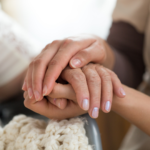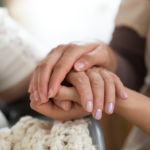Caring for the Caregiver: National Family Caregiver Month
We salute all family caregivers for the love, support and day-to-day, day-in and day-out care that you give to your family members.
 At JFCS we are always available to provide care for the Caregivers:
At JFCS we are always available to provide care for the Caregivers:
- Caregiver Support Groups for Spouses
- Individual Counseling
- Spirituality and Mindfulness
- Information and Referral to Resources
Contact Beverly Mishkin, Director of Senior Services, beverlym@jfcsonline.org or Chaplain Beverly Rubman, beverlyr@jfcsonline.org, for more information.
We share several readings below to support you as you take care of your loved ones…
The Peace of Wild Things
When despair grows in me
and I wake in the middle of the night at the least sound
in fear of what my life and my children’s lives may be,
I go and lie down where the wood drake
rests his beauty on the water, and the great heron feeds.
I come into the peace of wild things
who do not tax their lives with forethought
of grief. I come into the presence of still water.
and I feel above me the day-blind stars
waiting for their light. For a time
I rest in the grace of the world, and am free.
–Wendell Berry–


CARETAKER’S PRAYER
Dear God, give me the strength to face this day,
To deal with the tension, anxiety and dizzying confusion of my life.
Teach me to focus, to prioritize, to see with clarity.
God of patience, teach me to be patient.
Forgiving God, teach me to forgive.
Bless me with the courage to face my loved one’s illness and pain, amidst my own fears.
Touch me with your spiritual light, your love, your wisdom
So that I can continue my task tomorrow, knowing that You are by my side.
–Based on the writing of Rebbe Nachman of Breslov, appearing in The Gentle Weapon: Prayers for Everyday and Not-So-Everyday Moments (Jewish Lights)–
“It’s funny: I always imaged when I was a kid that adults had some kind of inner toolbox, fully of shiny tools: the saw of discernment, the hammer of wisdom, the sandpaper of patience. But then when I grew up I found that life handed you these rusty bent old tools—friendships, prayer, conscience, honesty—and said, Do the best you can with these, they will have to do. And most, against all odds, they’re enough.”
–Anne Lamott, Traveling Mercies: Some Thoughts on Faith, page 103–


Birdsong at Midnight
Sometimes a bird will sing at midnight.
Perhaps restless, perhaps confused,
Perhaps so full of joy and love
That music bursts forth.
Fill me with song on sleepless nights.
Fill me with music in the lonely deep.
Let the promise of a new day
Bring comfort and consolation.
–Alden Solovy, This Grateful Heart—
 Shavuot also is a time of great rejoicing, both in community in the synagogue and at home. Ashkenazi tradition includes the eating of dairy foods, such as blintzes and cheese cake, because the Torah is likened to milk and honey. Sephardic communities have more elaborate Shavuot dishes many of which also involve cheese but in different forms such as special rice and cheese pies and Turkish-style rice pudding (sutlatch).
Shavuot also is a time of great rejoicing, both in community in the synagogue and at home. Ashkenazi tradition includes the eating of dairy foods, such as blintzes and cheese cake, because the Torah is likened to milk and honey. Sephardic communities have more elaborate Shavuot dishes many of which also involve cheese but in different forms such as special rice and cheese pies and Turkish-style rice pudding (sutlatch). 
 To all Caregivers…
To all Caregivers…
 We are all dealing with grief now—loss of normalcy; loss of connection; fear of economic toll, nervous anticipation of the future. For those in our community who are mourning the loss of a loved one, the grief is intense and even more isolating because we do not have the traditional community supports to provide some sense of stability. As holiday times approach, the Empty Chair has become the Empty Table and the Empty Room. What are some tools that can give you the support you need?
We are all dealing with grief now—loss of normalcy; loss of connection; fear of economic toll, nervous anticipation of the future. For those in our community who are mourning the loss of a loved one, the grief is intense and even more isolating because we do not have the traditional community supports to provide some sense of stability. As holiday times approach, the Empty Chair has become the Empty Table and the Empty Room. What are some tools that can give you the support you need?
